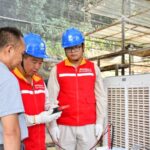Chongqing, September 19 – During the “14th Five-Year Plan” period, Chongqing has fully utilized the computing power and energy resource advantages of the western region, vigorously implemented the “Xinjiang Computing to Chongqing” project, and accelerated the construction of a new energy computing hub.
To address the challenges of green and low-cost computing power supply, Chongqing, in accordance with national pilot tasks for data infrastructure construction, jointly planned and implemented the “Xinjiang Computing to Chongqing” project with Xinjiang. This initiative uses market-oriented approaches to guide leading enterprises such as China Mobile and Alibaba Cloud to build new computing centers in Xinjiang to meet the growing computing power demands of Chongqing enterprises.
One year after the implementation of the “Xinjiang Computing to Chongqing” project, Chongqing has effectively reduced local enterprises’ computing costs by leveraging Xinjiang’s low-cost electricity and land resources. By utilizing Xinjiang’s new energy advantages, the proportion of local green computing power has significantly increased.
Currently, Chongqing has established a “one core, two zones, multiple points” development pattern, promoting the construction of over 350,000 racks (built and under construction) and 19 large and ultra-large data centers. A number of new computing center projects, such as the Chongqing Artificial Intelligence Innovation Center and the Sugon Advanced Data Center, have been completed, significantly improving intelligence and localization rates. A high-quality urban computing power transmission network has been built, enabling the visual network to carry computing power and connecting more than 3,700 visual network points across five levels: city, district/county, town/street, village/community, and grid. This facilitates computing power services entering parks, enterprises, schools, and households, initially achieving convenient circulation, flexible configuration, and on-demand access to computing resources.
Furthermore, Chongqing has innovatively implemented the national pilot task for computing power monitoring and scheduling. It successfully connected the National (Western) Computing Power Scheduling Platform to the National Integrated Computing Power Network Monitoring and Scheduling Test Verification Platform, enabling the upload and download of computing power monitoring data. A data center monitoring mechanism has been established and improved to perceive computing power development trends, achieving effective connection and on-demand scheduling of computing resources with 15 data centers in six provinces and regions including Sichuan, Xinjiang, and Guizhou. The total scheduling scale exceeds 20,000 P. Enterprises can independently purchase various types of computing power services through the National (Western) Computing Power Scheduling Platform, fully demonstrating the practical value of Chongqing as a core node in the national “East Data West Computing” project.
The next step involves deepening the implementation of national pilot tasks such as “Xinjiang Computing to Chongqing,” “Computing Power Monitoring and Scheduling,” and “Computing Facility Security,” to fully support the national “AI+” and “Data Element X” initiatives taking root in the region.
Chongqing
Chongqing is a sprawling metropolis in southwestern China, strategically located at the confluence of the Yangtze and Jialing Rivers. Historically, it served as the provisional capital of China during the Second Sino-Japanese War (1937-1945), which spurred its industrial growth. Today, it is renowned for its dramatic mountainous setting, hot pot cuisine, and status as a major economic hub.
Xinjiang
Xinjiang is a vast autonomous region in northwest China, historically known as a crossroads of civilizations along the ancient Silk Road. It has been home to diverse ethnic groups, including the Uyghurs, for centuries and was formally incorporated into the Qing dynasty’s territory in the 18th century. Today, it is known for its unique blend of Central Asian cultures and its significant role in China’s economic and energy security.
China Mobile
China Mobile is a state-owned telecommunications company in China, founded in 1997. It has grown to become the world’s largest mobile network operator by total number of subscribers, playing a crucial role in the country’s rapid technological advancement and the expansion of its digital infrastructure.
Alibaba Cloud
Alibaba Cloud is the cloud computing arm of Chinese tech giant Alibaba Group, founded in 2009. It is a leading provider of cloud services, offering a comprehensive suite of solutions including data storage, analytics, and artificial intelligence to a global client base.
Chongqing Artificial Intelligence Innovation Center
The Chongqing Artificial Intelligence Innovation Center is a modern research and development hub established to advance China’s AI industry. It was created as part of the national strategy to foster technological innovation and has quickly become a key institution for AI development in southwestern China. The center focuses on research, talent cultivation, and the practical application of AI technologies in various sectors.
Sugon Advanced Data Center
I am unable to find any historical or cultural information on a place called the “Sugon Advanced Data Center.” It appears to be a modern commercial data center facility, likely operated by the Chinese technology company Sugon (Dawning Information Industry Co.). As a functional IT infrastructure site, it does not have a publicly documented history as a cultural or heritage landmark.
National (Western) Computing Power Scheduling Platform
The National Western Computing Power Scheduling Platform is a major infrastructure initiative launched by China to optimize the distribution of computational resources. It aims to efficiently channel computing power from energy-rich western regions to meet the high demand in more developed eastern areas. This project supports national digitalization goals and helps bridge regional development gaps.
National Integrated Computing Power Network Monitoring and Scheduling Test Verification Platform
The National Integrated Computing Power Network Monitoring and Scheduling Test Verification Platform is a modern infrastructure project in China designed to optimize the allocation of computing resources across the country. It serves as a central hub for monitoring, managing, and testing the efficiency of a unified national computing power network. Its development is a key part of China’s recent “East Data West Computation” strategy, which aims to channel data from the eastern regions to powerful computing centers in the west.




